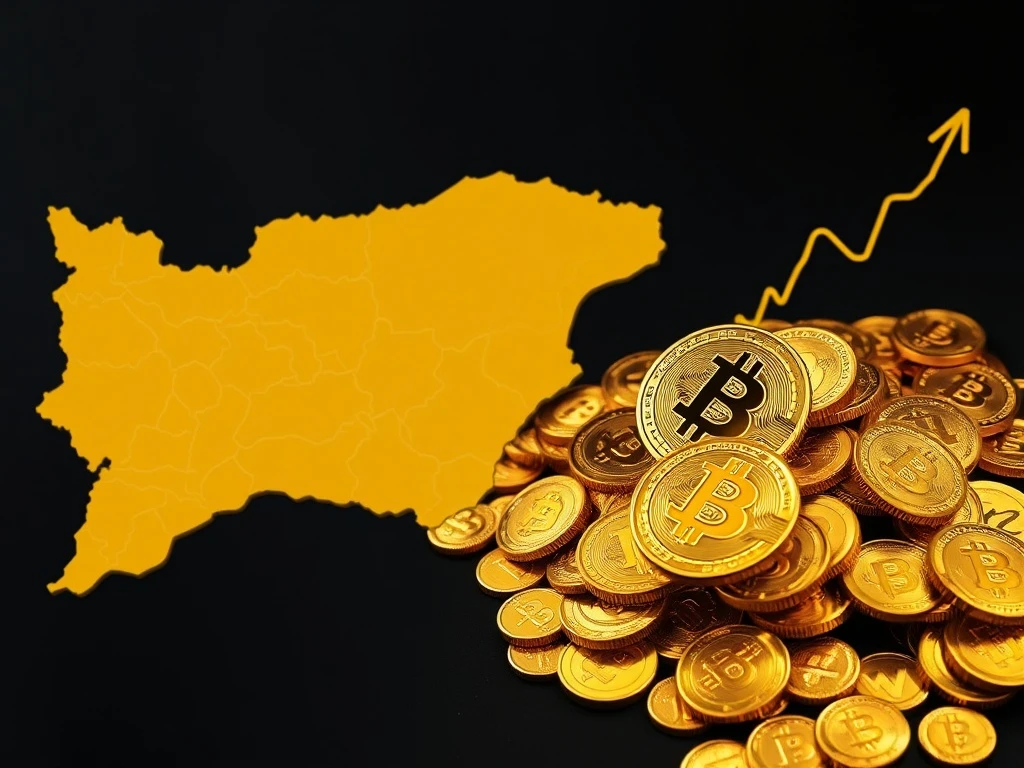Bulgaria Bitcoin Blunder: The Colossal $25 Billion Missed Opportunity

Imagine holding a treasure chest, only to sell it for a fraction of its true worth, just before its value skyrocketed. This isn’t a fantasy tale, but a stark reality for Bulgaria, whose 2018 sale of over 213,500 Bitcoin has become a focal point of debate. What if the country had held onto its Bitcoin? The answer is staggering: it could have wiped out a significant portion of its national debt. This incredible scenario compels us to ask: should governments rethink their approach to digital assets and consider a robust crypto investment strategy?
Bulgaria Bitcoin: A $25 Billion Question of Hindsight
In late 2017, the Balkan nation of Bulgaria seized a massive haul of 213,519 Bitcoin (BTC). At the time, this digital treasure was valued at approximately $3.5 billion, a substantial sum that could cover about a fifth of the country’s national debt. However, the government opted to sell the seized Bitcoin shortly after its acquisition in 2018. Fast forward to today, and the same amount of Bitcoin would be worth an astonishing $25.24 billion. This figure dramatically exceeds Bulgaria’s current public debt, which stands at around $24 billion, according to data from World Economics.
While it’s easy to look back with perfect clarity, the decision at the time was complex. The cryptocurrency market was still nascent, and its long-term potential was largely unproven in the eyes of traditional institutions. Yet, the sheer scale of the missed opportunity serves as a powerful case study for nations grappling with the role of digital assets.
Should Bitcoin as a Reserve Asset Be Reconsidered?
The story of Bulgaria’s Bitcoin sale has reignited a crucial discussion: should governments treat cryptocurrencies, particularly Bitcoin, as a reserve asset? The concept challenges conventional financial wisdom, given Bitcoin’s notorious volatility. Alex Obchakevich, founder of Obchakevich Research, highlighted this challenge, stating that “Bitcoin’s volatility makes it difficult to use it as a stable reserve.” He suggested that instead of a direct holding, countries should consider diversifying their assets.
Obchakevich’s recommendations for a prudent approach include:
- Limiting Bitcoin’s share to about 10-15% of total reserves.
- Implementing phased liquidation strategies to mitigate market impact.
- Utilizing derivatives for hedging against sharp price drops.
- Establishing a clear legal framework to ensure macroeconomic stability.
These points underscore the need for a nuanced approach, balancing potential gains with inherent risks when considering Bitcoin as a reserve asset.
Global Trends: Who Else Holds Government Crypto Holdings?
Despite the skepticism surrounding Bulgaria’s decision, many major nations have quietly accumulated significant government crypto holdings. A recent review indicates that governments collectively possess approximately 463,000 BTC, accounting for about 2.3% of Bitcoin’s total supply. This demonstrates a growing, albeit often discreet, recognition of Bitcoin’s value among state entities.
According to Bitcoin Treasurys data, the top holders include:
- United States: Over 198,000 BTC
- China: Exactly 190,000 BTC
- United Kingdom: 61,245 BTC
- Ukraine: 46,351 BTC (includes public officials’ holdings)
- North Korea: 13,562 BTC (largely acquired through state-sponsored hacking)
- Bhutan: 10,486 BTC
These figures highlight a global trend where governments, for various reasons, are increasingly involved in the cryptocurrency space, whether through seizures, strategic acquisitions, or even illicit activities.
Crafting a Smarter Crypto Investment Strategy for Nations
Valentin Mihov, co-CEO at Web3 market maker Enflux and a Bulgarian himself, offers a critical perspective on his government’s past decision. He argues that the incident “reflects how most governments still misunderstand what crypto can be: not just a speculative asset, but a strategic reserve opportunity.” Mihov acknowledges the challenges at the time, including immature custody solutions, regulatory uncertainty, and a general aversion to risk within conservative governments.
However, he suggests that a more forward-thinking crypto investment strategy could have been adopted. Had he been advising the Bulgarian government, Mihov would have likely recommended a partial liquidation, but crucially, he “would’ve argued for a long-term reserve structure.” He believes that “even a 10 or 20% strategic hold would’ve positioned Bulgaria ahead of the curve,” allowing the nation to benefit from Bitcoin’s subsequent appreciation while mitigating immediate risks.
The Unforeseen Path to National Debt Payoff?
The hypothetical scenario of Bulgaria using its seized Bitcoin for national debt payoff paints a compelling picture of what could have been. The $25 billion valuation today is not just a missed profit; it represents a tangible opportunity to significantly alleviate the country’s financial burden. This thought experiment raises a fundamental question for all nations: how can digital assets be leveraged for economic benefit, potentially even addressing significant financial challenges like national debt?
The Bulgarian case serves as a powerful reminder of the rapidly evolving financial landscape and the need for governments to adapt. While the volatility of cryptocurrencies remains a concern, the potential for strategic integration into national treasuries, with proper risk management and a clear crypto investment strategy, is becoming increasingly difficult to ignore. The debate over whether crypto is merely a speculative tool or a legitimate strategic asset will undoubtedly continue to shape global economic policies for years to come.
Conclusion: Learning from the Past, Shaping the Future
Bulgaria’s 2018 Bitcoin sale is a potent lesson in the unpredictable yet potentially transformative nature of digital assets. What was once seen as a risky, volatile seizure has, in hindsight, become a symbol of a colossal missed opportunity to address the national debt payoff. The debate over treating Bitcoin as a reserve asset is far from settled, but the increasing presence of government crypto holdings worldwide indicates a shift in perception.
For nations navigating the digital age, the Bulgarian experience underscores the importance of a well-considered crypto investment strategy. It highlights the need for governments to move beyond viewing cryptocurrencies solely as speculative instruments and to explore their potential as strategic reserves, albeit with careful risk assessment and robust regulatory frameworks. As the digital economy continues to mature, the question for governments is no longer whether to engage with crypto, but how wisely and strategically they will do so.









